|
|
|
Sort Order |
|
|
|
Items / Page
|
|
|
|
|
|
|
| Srl | Item |
| 1 |
ID:
103720
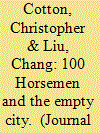

|
|
|
|
|
| Publication |
2011.
|
| Summary/Abstract |
We present game theoretic models of two of the most famous military bluffs from history. These include the legend of Li Guang and his 100 horsemen (144 BC), and the legend of Zhuge Liang and the Empty City (228 AD). In both legends, the military commander faces a much stronger opposing army, but instead of ordering his men to retreat, he orders them to act in a manner consistent with baiting the enemy into an ambush. The stronger opposing army, uncertain whether it is facing a weak opponent or an ambush, then decides to flee and avoid battle. Military scholars refer to both stories to illustrate the importance of deception in warfare, often highlighting the creativity of the generals' strategies. We model both situations as signaling games in which the opponent is uncertain whether the general is weak (i.e. has few soldiers) or strong (i.e. has a larger army waiting to ambush his opponent if they engage in combat). We then derive the unique Perfect Bayesian Equilibrium of the games. When the probability of a weak general is high enough, the equilibrium involves mixed strategies, with weak generals sometimes fleeing and sometimes bluffing about their strength. The equilibrium always involves the generals and their opponents acting as they did in the historical examples with at least a positive probability. When the probability of a weak general is lower (which is reasonable given the reputations of Li Guang and Zhuge Liang), then the unique equilibrium always involves bluffing by the general and retreat by his opponent.
|
|
|
|
|
|
|
|
|
|
|
|
|
|
|
|
| 2 |
ID:
156671
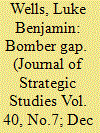

|
|
|
|
|
| Summary/Abstract |
For most of the 1950s, manned aircraft were the prime nuclear bomb delivery method, and were therefore a vital metric for British and American intelligence when calculating the Soviet threat. Each community reached very different conclusions from the same raw intelligence, generating the ‘bomber gap’ myth in the US but not in the UK. The information available was inconclusive, so in order to understand it estimators had to rely on their assumptions, which were different. Contrasting scopes for parochial capitalisation drew their conclusions further apart. Contrary to orthodox accounts of this episode, Soviet deception did not play a central role.
|
|
|
|
|
|
|
|
|
|
|
|
|
|
|
|
| 3 |
ID:
085783
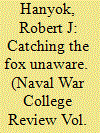

|
|
|
|
|
| Publication |
2008.
|
| Summary/Abstract |
The attack on the U.S. Pacific Fleet by the aircraft of the Japanese Striking Force (Kido Butai) at Pearl Harbor on the morning of 7 December 1941 was a total surprise to the American commands in Hawaii and Washington. The completeness of the operational surprise-the Imperial Japanese Navy had gathered the force, trained it, concentrated it, and sent it to the launch point without discovery by American intelligence, especially its radio component- was due largely to the success of the Japanese cover plan of radio denial and deception in hiding the existence, makeup, purpose, and timing of the attack. The Japanese navy's denial and deception plan left American radio intelligence, known also as "communications intelligence," with only scraps of information about the Japanese fleet's movements during the weeks prior to the attack.
|
|
|
|
|
|
|
|
|
|
|
|
|
|
|
|
| 4 |
ID:
099707
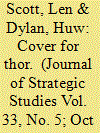

|
|
|
|
|
| Publication |
2010.
|
| Summary/Abstract |
In the late 1950s, as intercontinental ballistic missiles (ICBMs) replaced bombers, the development of Soviet ICBMs prompted fears of strategic vulnerability in the West. The Eisenhower administration's decision to deploy Intermediate Range Ballistic Missiles (IRBMs) on the territory of NATO allies sought to redress the perceived vulnerability until American ICBMs were ready. British deception planners considered how to enhance the threat posed by the IRBMs. An outline plan codenamed 'Celestial' was intended to persuade the Soviets that the otherwise vulnerable missiles could not be readily neutralised. This article explores this deception and how such planning also sought to convey accurate information alongside disinformation. It also suggests that deception planners appear to have given little heed to the potentially counterproductive consequences of such an operation.
|
|
|
|
|
|
|
|
|
|
|
|
|
|
|
|
| 5 |
ID:
010782
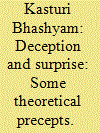

|
|
|
|
|
| Publication |
April 1996.
|
| Description |
5-8
|
|
|
|
|
|
|
|
|
|
|
|
|
|
|
|
| 6 |
ID:
010726
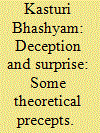

|
|
|
|
|
| Publication |
April 1996.
|
| Description |
5-8
|
|
|
|
|
|
|
|
|
|
|
|
|
|
|
|
| 7 |
ID:
040366
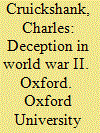

|
|
|
|
|
| Publication |
Oxford, Oxford University Press, 1979.
|
| Description |
xiii, 248p.Hbk
|
| Standard Number |
019215849X
|
|
|
|
|
|
|
|
|
|
|
|
Copies: C:1/I:0,R:0,Q:0
Circulation
| Accession# | Call# | Current Location | Status | Policy | Location |
| 018730 | 940.54012/CRU 018730 | Main | On Shelf | General | |
|
|
|
|
| 8 |
ID:
116240
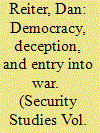

|
|
|
|
|
| Publication |
2012.
|
| Summary/Abstract |
Realists propose that elected leaders that seek war but face a hesitant public may use deception to build public support for war. Leaders may secretly make provocative diplomatic or military moves to push the adversary to attack first, rallying the public behind a war effort seen as defensive, or publicly exaggerate the threat posed by the adversary. This paper develops a liberal institutionalist critique of this theory, positing that elected leaders are deterred from engaging in such deception because democratic political institutions such as political competition, a professionalized military, and the marketplace of ideas increase the likelihood that such moves will be exposed, and once exposed, deceptive politicians will suffer domestic political punishment. The paper examines the thesis that Franklin Roosevelt sought to provoke Germany and Japan to war in 1941, finding little support. It also finds that in general autocratic leaders are more likely than elected leaders to deceive.
|
|
|
|
|
|
|
|
|
|
|
|
|
|
|
|
| 9 |
ID:
148638
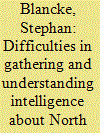

|
|
|
| 10 |
ID:
165319


|
|
|
|
|
| Summary/Abstract |
When and why do friendly states deliberately share and unwittingly accept fabricated intelligence about others? Recent work on the interpersonal foundations of security cooperation suggests intelligence liaison is a type of embedded relationship that requires a dependable route for exchange (close personal ties) and a consistent record of exchange (reliably meeting expectations). We extend this argument to show that the relational embeddedness underpinning truthful intelligence liaison also explains the sharing of fabricated intelligence. We argue that intimate personal relations and a history of reliable exchange create a channel for effectively transmitting false information, for the recipient is unlikely to challenge its authenticity, and that violated cooperative expectations provide a reason for attempting to deceive a partner. Drawing on extensive archival research, we evaluate our theory by analyzing Britain's decision to share fabricated intelligence about Germany with the United States in 1941.
|
|
|
|
|
|
|
|
|
|
|
|
|
|
|
|
| 11 |
ID:
139409
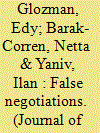

|
|
|
|
|
| Summary/Abstract |
The usual purpose of negotiations is to explore options and reach an agreement, if possible. We investigated a notable exception to this generalization, where a party negotiates without any intention of reaching an agreement. False negotiation occurs when a party gains more by stalling the negotiations until an external change takes place that improves its position considerably. While false negotiators aim to avoid agreement within the current frame of the negotiations, they also aim to keep the negotiation process alive, since walking away from the negotiation table could endanger their position. We report the results of a study that compared the actions of false and sincere negotiators. The false negotiators used competitive tactics that encumbered the negotiations, yet they concealed their intentions by maintaining a facade of cooperation. Our theoretical discussion is focused on the balancing act involved in false negotiations and the challenges it poses for actors in social, managerial, and political settings. We conclude our analysis with an example from the realm of international negotiations.
|
|
|
|
|
|
|
|
|
|
|
|
|
|
|
|
| 12 |
ID:
151105


|
|
|
|
|
| Summary/Abstract |
The post-World War II Australian military war crimes trials of Japanese from 1945–51 have been criticised for using a rule of evidence considerably relaxed from the ordinary requirements of a criminal trial, one that did not require witnesses to give evidence in person. Circumstantial evidence suggests that, in relation to a trial held in Darwin in March 1946 for war crimes committed in Timor, the secretive Special Operations Australia, otherwise known as the Services Reconnaissance Department (SRD), took advantage of the rule. This article argues that the SRD did not allow their members to give evidence in person in an attempt to control and limit the dissemination of information about their operational and security failures in Timor from 1943–45. The SRD operation was adjudged by its own official historian as displaying ‘gross inefficiency and criminal negligence’. While the SRD’s failures were known to select personnel at the time, access restrictions to archival records in the post-war period, including the war crimes trials, meant that the extent of its failures and how it appeared to manage knowledge of them has not been widely known.
|
|
|
|
|
|
|
|
|
|
|
|
|
|
|
|
| 13 |
ID:
104625
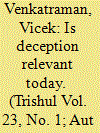

|
|
|
| 14 |
ID:
106579
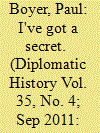

|
|
|
| 15 |
ID:
010780
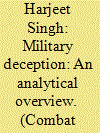

|
|
|
|
|
| Publication |
April 1996.
|
| Description |
21-28
|
|
|
|
|
|
|
|
|
|
|
|
|
|
|
|
| 16 |
ID:
010724
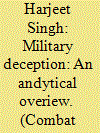

|
|
|
|
|
| Publication |
April 1996.
|
| Description |
21-28
|
|
|
|
|
|
|
|
|
|
|
|
|
|
|
|
| 17 |
ID:
190105
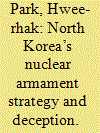

|
|
|
|
|
| Summary/Abstract |
This article analyzes North Korea’s nuclear armament strategy. For this purpose, it applies Vipin Narang’s theory to North Korea and analyzes North Korea’s efforts to develop and strengthen its nuclear weapons on a strategic level. This study argues that North Korea’s deception operations were crucial to the ultimate success of its “strategic” nuclear buildup. This article found that North Korea initially employed a “hiding strategy,” but after its nuclear program was exposed, it managed to continue its nuclear program through deceptive agreements with the United States and eventually succeeded in developing nuclear weapons in 2013. Then, North Korea adopted a “sprinting strategy” and initiated deceptive denuclearization negotiations with the United States to prevent a military strike by the United States and gain the time necessary for its continuous nuclear buildup. China also allowed a “sheltered pursuit” through tolerance of North Korea’s nuclear armament and diplomatic assistance as well as various clandestine assistances.
|
|
|
|
|
|
|
|
|
|
|
|
|
|
|
|
| 18 |
ID:
178923
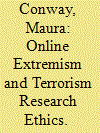

|
|
|
|
|
| Summary/Abstract |
This article reflects on two core issues of human subjects’ research ethics and how they play out for online extremism and terrorism researchers. Medical research ethics, on which social science research ethics are based, centers the protection of research subjects, but what of the protection of researchers? Greater attention to researcher safety, including online security and privacy and mental and emotional wellbeing, is called for herein. Researching hostile or dangerous communities does not, on the other hand, exempt us from our responsibilities to protect our research subjects, which is generally ensured via informed consent. This is complicated in data-intensive research settings, especially with the former type of communities, however. Also grappled with in this article therefore are the pros and cons of waived consent and deception and the allied issue of prevention of harm to subjects in online extremism and terrorism research. The best path forward it is argued—besides talking through the diversity of ethical issues arising in online extremism and terrorism research and committing our thinking and decision-making around them to paper to a much greater extent than we have done to-date—may be development of ethics guidelines tailored to our sub-field.
|
|
|
|
|
|
|
|
|
|
|
|
|
|
|
|
| 19 |
ID:
114692
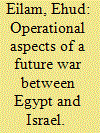

|
|
|
|
|
| Publication |
2012.
|
| Summary/Abstract |
The peace treaty between Israel and Egypt has survived since 1979. Even so, following the events in Egypt, there is a growing tension between the two states, particularly surrounding the Sinai, which could cause a crisis and even a war. In such a case, the main battlefield would be in Sinai, and there would be several dominant aspects. Some of them would appear for the first time, compared with previous wars, such as a collision between Israeli and Egyptian units of around corps size. Other aspects would be more familiar, such as the ratio between the size of the forces to that of the battlefield, the "fog of war," night fighting, "friendly fire" and deception.
|
|
|
|
|
|
|
|
|
|
|
|
|
|
|
|
| 20 |
ID:
157884
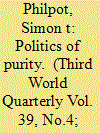

|
|
|
|
|
| Summary/Abstract |
The International Cricket Council and civil prosecutions of three Pakistani cricketers and their fixer brought player corruption in cricket to public scrutiny once more. A range of English media commentators and the sentencing judge referred to cricket’s loss of innocence because of the deception of the Pakistani cricketers. However, commercialisation, racism and dealings with corrupt political regimes have all exposed cricket as less innocent than many of its English defenders would admit. Furthermore, the demonisation of Pakistani cricketers as cheats blurs the boundary between individual responsibility and cultural characteristics with negative consequences for Muslims in the post-9/11 world.
|
|
|
|
|
|
|
|
|
|
|
|
|
|
|
|
|
|
|
|
|